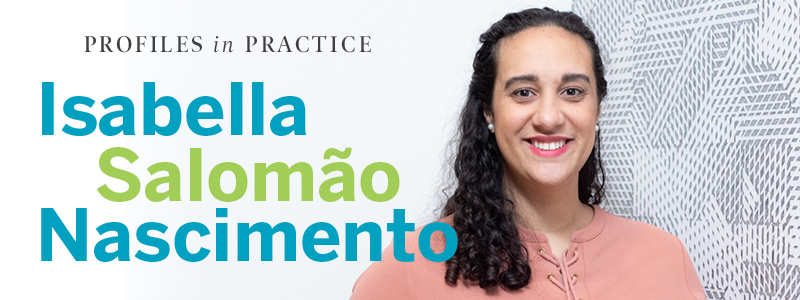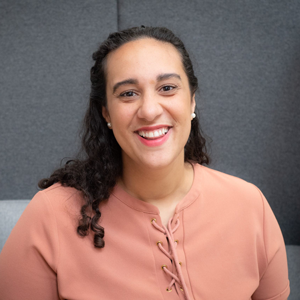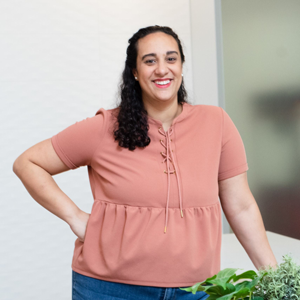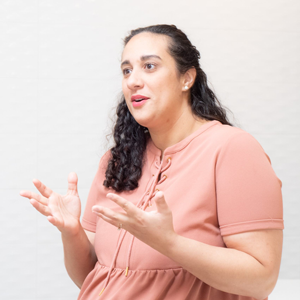
It’s been a whirlwind four years for Isabella Salomão Nascimento. After graduating from the University of Chicago Law School in 2018, she worked for the ACLU of Minnesota for two years before starting a private practice in the Minneapolis office of Ballard Spahr. Along the way, she started a family—and, of course, contended with the COVID-19 pandemic—all while handling some of the nation’s highest-profile and most urgent media law cases.
She recently spoke to Hennepin Lawyer about her practice and hopes for the future.
You began your career as a lawyer at the ACLU of Minnesota. What prompted you to make the move to private practice?
 My legal career started a bit before my time with the ACLU because I worked for a year before law school at the Legal Rights Center in Hennepin County. I knew I wanted to be a litigator, but I didn’t know whether that would be criminal or civil. After law school, I had the awesome opportunity to clerk for Judge Catharine Easterly of the DCCA. During that year, it really hit me how many tools are available to you in civil litigation, like depositions and interrogatories, that just aren’t available in criminal cases but really should be. Those experiences led me to my first real ‘lawyering’ job at the ACLU of Minnesota. There, I had the amazing opportunity to work alongside [Ballard Spahr attorneys] Jon Bye, Wally Hilke, and Leita Walker. I work with them now full-time, in particular Leita, and I love the work that we’re doing together—that we represent media clients as they try to bring information front and center to the public. Every piece of my career, even before I was a lawyer, has been a building block to where I am now. I’m very grateful for those opportunities.
My legal career started a bit before my time with the ACLU because I worked for a year before law school at the Legal Rights Center in Hennepin County. I knew I wanted to be a litigator, but I didn’t know whether that would be criminal or civil. After law school, I had the awesome opportunity to clerk for Judge Catharine Easterly of the DCCA. During that year, it really hit me how many tools are available to you in civil litigation, like depositions and interrogatories, that just aren’t available in criminal cases but really should be. Those experiences led me to my first real ‘lawyering’ job at the ACLU of Minnesota. There, I had the amazing opportunity to work alongside [Ballard Spahr attorneys] Jon Bye, Wally Hilke, and Leita Walker. I work with them now full-time, in particular Leita, and I love the work that we’re doing together—that we represent media clients as they try to bring information front and center to the public. Every piece of my career, even before I was a lawyer, has been a building block to where I am now. I’m very grateful for those opportunities.
Whether it’s the transition from law student to practicing lawyer, or from working at a nonprofit to a law firm, have there been any changes or shifts that were surprising?
The most surprising thing for me as a lawyer has always been the weight of the responsibility of the cases I work on. With media law cases, you can tell what implications the outcome would have on the landscape of media law nationwide. I feel very responsible for the implications of my work, because it can mean more or less access to information for the public. Even as a clinical student in law school, you’re working on cases, but you may not quite understand the responsibility because you’re not working on the case full-time and the final call isn’t yours. But in practice, the work is full-time, and the outcome on day 100 hinges on the decisions I make on, say, day 3 or day 4. It’s something that I hope to never take for granted.
In the move from working for a nonprofit to private practice, I had to do some soul searching. I had to ask myself, “Will you be doing what you love?” If not for media law, I don’t think I would have made the switch. I’m a person who needs to know I’m following my passion and getting it right for my clients, all of whom have a lot at stake.
Of the matters you’ve worked on thus far, has any particular one stood out to you?
 I worked to defend journalists in the wake of the killings of George Floyd and Daunte Wright, and those were very formative matters for me. In some ways, representing a journalist was the first time I dealt with a “perfect plaintiff,” you could say. They document everything, so they create their own record for their case. This is an instance when you had an almost undeniably credible plaintiff, and that shapes the approach to the case. Also, it’s hard to overstate the importance of the outcome of these matters. We were at a reckoning point in terms of social justice, and the world was watching us here in Minnesota. The reporters I was representing were the eyes of the world, and it was critically important that they be able to keep telling the public what was happening. To be able to help them carry out that mission was incredible.
I worked to defend journalists in the wake of the killings of George Floyd and Daunte Wright, and those were very formative matters for me. In some ways, representing a journalist was the first time I dealt with a “perfect plaintiff,” you could say. They document everything, so they create their own record for their case. This is an instance when you had an almost undeniably credible plaintiff, and that shapes the approach to the case. Also, it’s hard to overstate the importance of the outcome of these matters. We were at a reckoning point in terms of social justice, and the world was watching us here in Minnesota. The reporters I was representing were the eyes of the world, and it was critically important that they be able to keep telling the public what was happening. To be able to help them carry out that mission was incredible.
Mentorship makes a difference for many attorneys, no matter their career stage. Do you have a mentor, and if so, how have you benefited from that?
I have had the great fortune of having a lot of mentors, even during my relatively short legal career to date. One of my first mentors was my judge, Catharine F. Easterly, out in D.C. She has been a huge champion of my legal career. She has helped me become a better thinker, a better writer, and a better lawyer and person overall. In my next position at the ACLU-MN, one of my colleagues, Clare Diegel, was years ahead of me in practice but never treated me as someone more junior. Instead, she was very collaborative and helped me build my confidence, all while helping me learn to be a more savvy lawyer. And most recently, my mentor has been Leita Walker, a First Amendment litigator here at Ballard Spahr. She is studiously looking out for me, helping me understand the ins and outs of media law practice, and finding opportunities for me to shine. It’s thanks to her that I have grown a little bit each and every day I’ve been at the firm.
Over the course of your career, what changes do you hope to see in the legal industry?
I think the legal industry is on its way to placing more importance on making it easier for folks who look like me—being both a woman and a person of color—to see a clearer path toward success, whatever that means to them. When I look at, say, the ranks of partners, I hope to one day see a 50/50 split, at least. That’s on the career side of things. On the personal side, I think Ballard Spahr does an exceptional job of making sure someone like me can have both a budding practice and a family, so if there’s somewhere I want to be while growing my family and my legal career, it’s here.
folks who look like me—being both a woman and a person of color—to see a clearer path toward success, whatever that means to them. When I look at, say, the ranks of partners, I hope to one day see a 50/50 split, at least. That’s on the career side of things. On the personal side, I think Ballard Spahr does an exceptional job of making sure someone like me can have both a budding practice and a family, so if there’s somewhere I want to be while growing my family and my legal career, it’s here.
But the reality is, there’s never a convenient time to create family, and I hope the legal industry creates a better space for that. I think I have been very fortunate to work at two places that have been incredibly kind, generous, and supportive of starting a family: the ACLU-MN and Ballard Spahr. That being said, the requirements of a legal practice are not conducive to having a family, no matter how understanding your employer is. You feel like you always have to be available, always responsive to a court deadline, always ready to put out a fire that arises. Most of all, I’m able to have both because I’m lucky to have an incredibly supportive and understanding partner. I don’t know that I could do what I am doing today without him.
 By Will Ashenmacher
By Will Ashenmacher
Will Ashenmacher is a licensed attorney, former journalist, and communications manager in the Minneapolis office of Ballard Spahr. In his role, he works across the national firm’s seven Western offices to find and further stories about Ballard Spahr’s attorneys, work matters, and firm culture. Ashenmacher volunteers with the University of St. Thomas’ ThreeSixty Journalism program. He lives in the Longfellow neighborhood of Minneapolis with this dog, Kitsu.